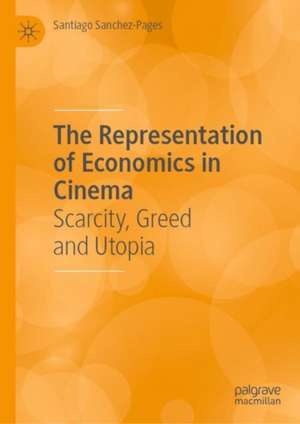The Representation of Economics in Cinema: Scarcity, Greed and Utopia
Autor Santiago Sanchez-Pagesen Limba Engleză Hardback – 14 sep 2021
| Toate formatele și edițiile | Preț | Express |
|---|---|---|
| Paperback (1) | 636.63 lei 43-57 zile | |
| Springer International Publishing – 15 sep 2022 | 636.63 lei 43-57 zile | |
| Hardback (1) | 640.88 lei 43-57 zile | |
| Springer International Publishing – 14 sep 2021 | 640.88 lei 43-57 zile |
Preț: 640.88 lei
Preț vechi: 753.97 lei
-15% Nou
Puncte Express: 961
Preț estimativ în valută:
122.65€ • 127.71$ • 103.65£
122.65€ • 127.71$ • 103.65£
Carte tipărită la comandă
Livrare economică 10-24 martie
Preluare comenzi: 021 569.72.76
Specificații
ISBN-13: 9783030801809
ISBN-10: 3030801802
Pagini: 190
Ilustrații: XIII, 220 p. 1 illus.
Dimensiuni: 148 x 210 mm
Greutate: 0.43 kg
Ediția:1st ed. 2021
Editura: Springer International Publishing
Colecția Palgrave Macmillan
Locul publicării:Cham, Switzerland
ISBN-10: 3030801802
Pagini: 190
Ilustrații: XIII, 220 p. 1 illus.
Dimensiuni: 148 x 210 mm
Greutate: 0.43 kg
Ediția:1st ed. 2021
Editura: Springer International Publishing
Colecția Palgrave Macmillan
Locul publicării:Cham, Switzerland
Cuprins
Chapter 1: Introduction: Mr Smith Goes to the Movies.- Chapter 2: Scarcity, Conflicts, and Dystopia.- Chapter 3: Evil is the Root of all Money.- Chapter 4: Brokers, Bankers and Boiler Rooms.- Chapter 5: Evil, Inc.- Chapter 6: Disruptors.- Chapter 7: The Path of Workers.- Chapter 8: Women at Work.- Chapter 9: Crises.- Chapter 10: Conclusion: Post-Scarcity and Utopia
Notă biografică
Santiago Sanchez-Pages is associate professor in economics at King’s College London, UK. His academic research focuses on political economy, economic theory, and experimental economics. His articles have been published in leading international journals. He also writes on film and popular culture and has published several short stories.
Textul de pe ultima copertă
“This wonderful book can make you aware of some splendid works in the “seventh art” that already influence, or should influence, anyone who wants to understand economics. It can be used to teach an economics class in an innovative way, or simply to enjoy economics and movies differently.”
— Antonio Cabrales, Professor of Economics, Universidad Carlos III Madrid.
“In this outstandingly entertaining book, Professor Sanchez-Pages uses the lens of a micro-economist to dissect some of the most seen films of our time. The perspective is startlingly brilliant and unique. Once you have read this book you will want to see these movies again, but from a completely novel perspective.”
— Shanker Satyanath, Professor of Politics, New York University.
Cinema articulates the economic anxieties of each generation of filmmakers and audiences. It has an influence on people’s views on various economic issues and many orders of magnitude larger than that of economics as a discipline. This book offers a sweeping study of the representation of economics in cinema across a wide range of areas and genres, from the conflicts over resources in the lawless Old West to the post-scarcity societies of science fiction futures. This book studies how films have portrayed trade unions, scarcity, money, businesses, innovators, migrant workers, working women, globalization, the stock market, and the automation of work. It aims to be useful to those who are interested in cinema with economic themes and to those who want to learn about economics through cinema.
Santiago Sanchez-Pages is associate professor in economics at King’s College London, UK. His academic research focuses on political economy, economic theory, and experimental economics. His articles have been published in leading international journals. He also writes on film and popular culture and has published several short stories.
— Antonio Cabrales, Professor of Economics, Universidad Carlos III Madrid.
“In this outstandingly entertaining book, Professor Sanchez-Pages uses the lens of a micro-economist to dissect some of the most seen films of our time. The perspective is startlingly brilliant and unique. Once you have read this book you will want to see these movies again, but from a completely novel perspective.”
— Shanker Satyanath, Professor of Politics, New York University.
Cinema articulates the economic anxieties of each generation of filmmakers and audiences. It has an influence on people’s views on various economic issues and many orders of magnitude larger than that of economics as a discipline. This book offers a sweeping study of the representation of economics in cinema across a wide range of areas and genres, from the conflicts over resources in the lawless Old West to the post-scarcity societies of science fiction futures. This book studies how films have portrayed trade unions, scarcity, money, businesses, innovators, migrant workers, working women, globalization, the stock market, and the automation of work. It aims to be useful to those who are interested in cinema with economic themes and to those who want to learn about economics through cinema.
Santiago Sanchez-Pages is associate professor in economics at King’s College London, UK. His academic research focuses on political economy, economic theory, and experimental economics. His articles have been published in leading international journals. He also writes on film and popular culture and has published several short stories.
Caracteristici
Analyses the intimate relationship between economics and cinema through brief cultural history films Considers topics as diverse as unions, immigration, globalization, working women, and automation Contrasts how economists make sense of the economy with how movies do so
